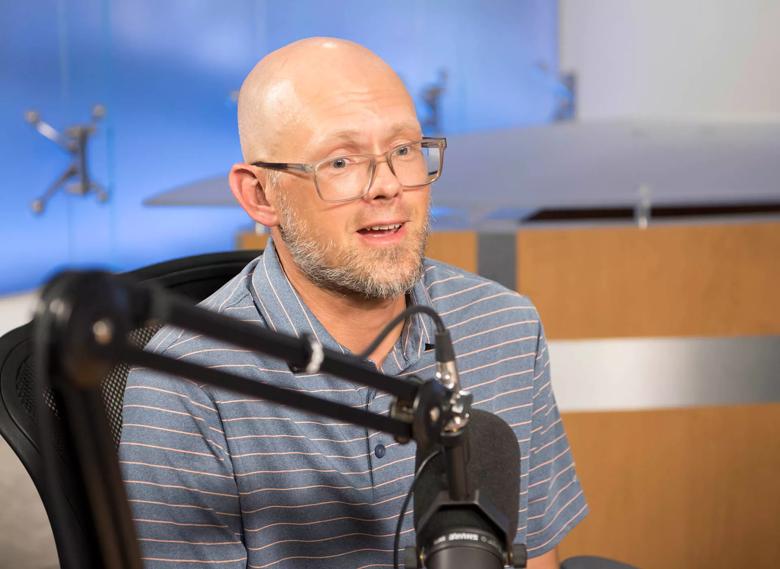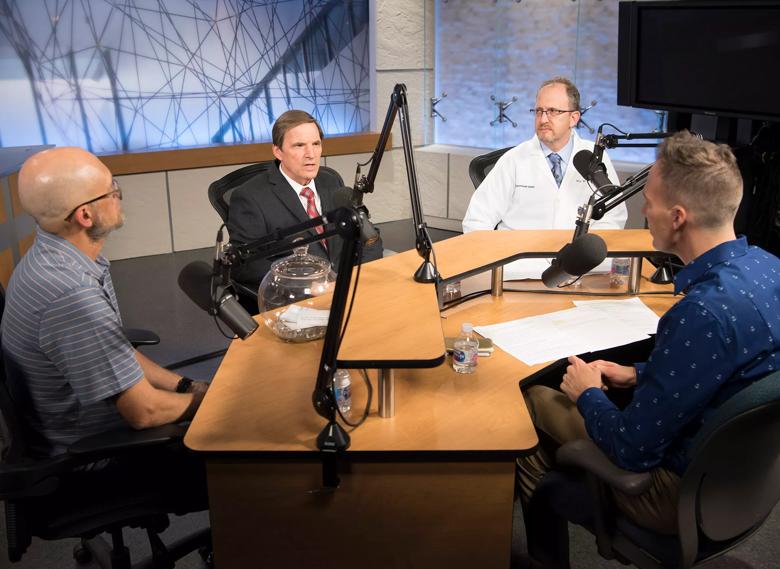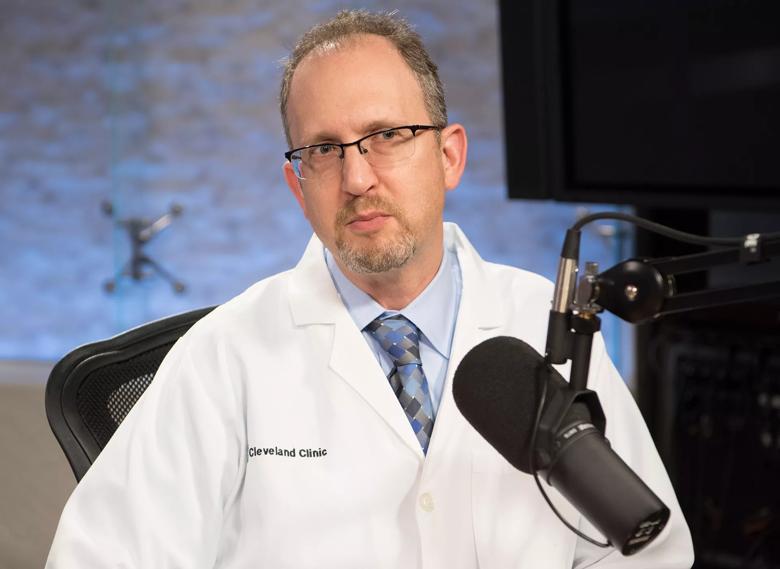Cleveland Clinic News Service | 216.444.0141
We’re available to shoot custom interviews & b-roll for media outlets upon request.
CCNS health and medical content is consumer-friendly, professional broadcast quality (available in HD), and available to media outlets each day.

70,467.
That’s the number of Americans who died of a drug overdose in 2017, according to the National Center for Health Statistics.
Terry Keith feels fortunate that the number wasn’t 70,468.
“I overdosed five or six times (before) I decided to get clean,” explained Terry, age 44, who will celebrate two years of sobriety in December. “Finally, I grew up and realized that it wasn’t normal to be preoccupied with drinking and using drugs constantly. It wasn’t normal to be overdosing
.”
Terry gives much of the credit for his recovery to the staff at Cleveland Clinic’s Alcohol and Drug Recovery Center (ADRC), which is based at Lutheran Hospital. Their ability to carefully evaluate his addiction, and customize and innovative treatment plan for him based on a combination of 12-step recovery work, professional group therapy and evidence-based medical treatment enabled him to succeed when previous attempts failed.
“I listened to the people. They told me what to do and provided faith and hope,” noted Terry, who works in the restaurant industry. “I put my life in their hands and everything worked out.”
RELATED: Listen to Terry’s story on the Cleveland Clinic podcast “The Comeback”

Image content: This image is available to view online.
View image online (https://assets.clevelandclinic.org/transform/bc38d4aa-f7f4-4a9c-8745-3270b67f1720/terry-keith-podcast-1_jpg)
Terry Keith overcame a near-deadly drug addiction through Cleveland Clinic’s Alcohol and Drug Recovery Center. (Courtesy: Cleveland Clinic)
Rudy Kump, clinical manager for the ADRC outpatient unit, sees Terry’s success slightly differently. “We’re trying to change what is, sometimes, a lifetime of addictive thinking,” he said. “We can outline (treatment) offerings and give our recommendations. But it’s up to people like Terry to decide, ‘Yeah, we’ll do this.’”
Terry took his first drink of alcohol at age 18, and rarely stopped drinking or using a wide array of progressively more dangerous and addictive drugs during the ensuing two and a half decades. Heroin. Cocaine. Ecstasy. “I tried pretty much anything I could get my hands on,” he said.
RELATED: Patient is Opioid-Free After Spending 20 Years Addicted to Pain Medications

Image content: This image is available to view online.
View image online (https://assets.clevelandclinic.org/transform/2722e276-216e-4cfb-9f6e-2d16f3718382/terry-keith-the-comeback_jpg)
Terry Keith overcame a near-deadly drug addiction through Cleveland Clinic’s Alcohol and Drug Recovery Center. (Courtesy: Cleveland Clinic)
By the time he moved on to fentanyl and carfentanyl – opioids used to manage major surgeries and sedate large animals that are thousands of times more potent than heroin – Terry was on a deadly, downward spiral that showed little sign of abating. Along the way, he lost countless jobs, got divorced, spent time homeless and became estranged from many of his family members.
But it was his fear of losing a good job that finally prompted him to at last take seriously his desire to rid himself of his addiction. “I had found a good career, and that gave me the push to say, ‘Okay, this has got to change,’” Terry added. “I asked for help. That’s my advice for others. Just ask for help.”
David Streem, MD, medical director for ADRC, said the key to treating the 7,000 clinically-dependent patients who come to ADRC annually is to understand just how dangerous addiction can be: “Everyone is vulnerable, and everyone needs a safe, nurturing place to get high-quality addiction treatment. That’s something Rudy and I, and the rest of the staff, are extremely passionate about.”

Image content: This image is available to view online.
View image online (https://assets.clevelandclinic.org/transform/1a8a30da-3dd1-40f5-b9a4-0d651b4d09c7/david-streem-podcast_jpg)
Terry Keith overcame a near-deadly drug addiction through Cleveland Clinic’s Alcohol and Drug Recovery Center. (Courtesy: Cleveland Clinic)
According to Terry, the best advice he got throughout his recovery process came from Rudy, who told him that “meeting makers make it. It’s a very simple phrase, but to get traction in life, I got to keep going to meetings. Any 12-step meeting. They make me realize I’m not alone.”
But he is well aware that, ultimately, the decision to get sober – and stay sober – is all on him.
“I protected my drinking and my drugging like some people protect their loves ones or their pets or their savings,” he proclaimed. “It was just time to grow up (because) the world wasn’t getting my best.”
Cleveland Clinic is a nonprofit multispecialty academic medical center that integrates clinical and hospital care with research and education. Located in Cleveland, Ohio, it was founded in 1921 by four renowned physicians with a vision of providing outstanding patient care based upon the principles of cooperation, compassion and innovation. Cleveland Clinic has pioneered many medical breakthroughs, including coronary artery bypass surgery and the first face transplant in the United States. Cleveland Clinic is consistently recognized in the U.S. and throughout the world for its expertise and care. Among Cleveland Clinic’s 82,600 employees worldwide are more than 5,786 salaried physicians and researchers, and 20,700 registered nurses and advanced practice providers, representing 140 medical specialties and subspecialties. Cleveland Clinic is a 6,728-bed health system that includes a 173-acre main campus near downtown Cleveland, 23 hospitals, 280 outpatient facilities, including locations in northeast Ohio; Florida; Las Vegas, Nevada; Toronto, Canada; Abu Dhabi, UAE; and London, England. In 2024, there were 15.7 million outpatient encounters, 333,000 hospital admissions and observations, and 320,000 surgeries and procedures throughout Cleveland Clinic’s health system. Patients came for treatment from every state and 112 countries. Visit us at clevelandclinic.org. Follow us at x.com/CleClinicNews. News and resources are available at newsroom.clevelandclinic.org.
Editor’s Note: Cleveland Clinic News Service is available to provide broadcast-quality interviews and B-roll upon request.